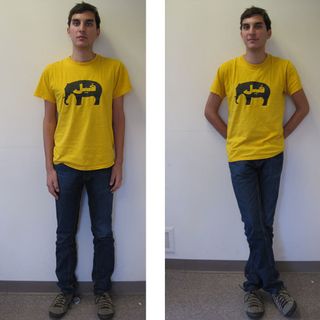Posting Pics Online? What Your Photos Say About You

Those photos you post on Facebook could paint an accurate picture of your personality, new research on first impressions suggests.
And perhaps as expected, the more candid a shot the more nuances of your personality show through.
"In an age dominated by social media where personal photographs are ubiquitous, it becomes important to understand the ways personality is communicated via our appearance," said study researcher Laura Naumann of Sonoma State University. "The appearance one portrays in his or her photographs has important implications for their professional and social life."
With this information, there's always the option of tweaking your image, and thus your personality to the outside world. "If you want potential employers or romantic suitors to see you as a warm and friendly individual, you should post pictures where you smile or are standing in a relaxed pose," Naumann said.
Scientists have known physical appearance is important for first impressions and that such initial impressions can be hard to undo, particularly negative ones. Studies have shown judgments made at first glance of a CEO can predict his or her success. But until now little was known about how well people judged personality based on appearance and what physical factors are most important.
In the new study, 12 observers looked at full-body photos of 123 undergraduate students who they had never met before. Six observers viewed the students in a neutral pose and six saw the same students in a spontaneous pose.
The participants rated each photo on 10 personality traits: extraversion, agreeableness, conscientiousness, emotional stability, openness (open to experience), likability, self-esteem, loneliness, religiosity and political orientation.
Sign up for the Live Science daily newsletter now
Get the world’s most fascinating discoveries delivered straight to your inbox.
To figure out accuracy of the judgments, the researchers compared the results with the posers' self-ratings and ratings from three close friends.
For the controlled poses, the observers accurately judged extraversion and self-esteem. When participants looked at the naturally expressive shots, which revealed dynamic non-verbal cues, they were nearly spot-on, getting nine out of the 10 traits correct (everything but political orientation).
For instance, both the neutral and expressive photos garnered about a 70 percent success rate.
"Extraversion is one of those things that's probably the easiest trait to judge," Naumann told LiveScience. "Even without seeing whether someone is smiling or not people can pick that up."
But when judging likeability, observers got it right on average for 55 percent of the photos with neutral poses and 64 percent of the expressive photos. Similar results were found for agreeableness, with participants judging correctly 45 percent of the time for neutral poses compared with 60 percent in the expressive images.
Beyond pure science, the researchers say the results, which will be detailed in the December issue of the journal Personality and Social Psychology Bulletin, have practical implications.
For example, if you want to come off as an extravert, try to smile more, stand in energetic and less tense ways, and gear your overall appearance to look healthy (as opposed to sickly), neat and stylish, the study found. For those interested in seeming open to new experiences, it'd be best to show off a distinctive style of dressing rather than a healthy, neat appearance.
- 10 Things You Didn't Know About You
- 7 Thoughts That Are Bad For You
- Human Nature News
Jeanna Bryner is managing editor of Scientific American. Previously she was editor in chief of Live Science and, prior to that, an editor at Scholastic's Science World magazine. Bryner has an English degree from Salisbury University, a master's degree in biogeochemistry and environmental sciences from the University of Maryland and a graduate science journalism degree from New York University. She has worked as a biologist in Florida, where she monitored wetlands and did field surveys for endangered species, including the gorgeous Florida Scrub Jay. She also received an ocean sciences journalism fellowship from the Woods Hole Oceanographic Institution. She is a firm believer that science is for everyone and that just about everything can be viewed through the lens of science.
Most Popular






